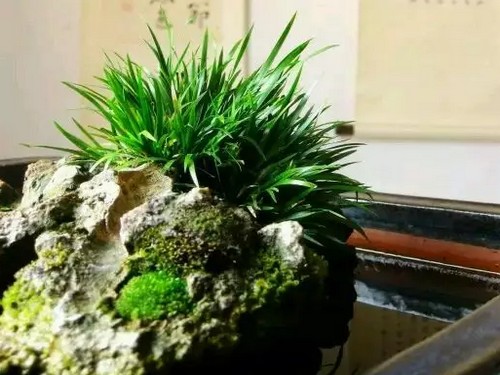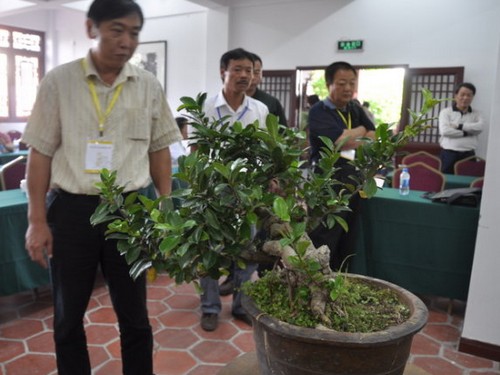The eye-moistening and eye-protecting effect of calamus bonsai
Nowadays, many people sit in front of the computer for a long time every day, and young people like to keep playing with their mobile phones. "xerophthalmia" caused by eye fatigue is very common. The ancient literati also had the disadvantage of losing their eyesight in reading and writing at their desk. In view of this situation, a very light countermeasure was invented in traditional life, that is, to display a "stone basin" in the study and make use of the condensation on the calamus leaves to moisturize the eyes.

The ancients believed that every morning, scrubbing your eyes with dew condensed from cypress leaves or calamus leaves at night can keep your eyes healthy and brighten your eyesight, such as Li Shizhen's Compendium of Materia Medica, that is, "Cypress leaves and calamus are exposed." However, night dew on cypress trees is not so easy to collect. In contrast, calamus can be planted in small pots and maintained in the study. Therefore, the artificial maintenance of night dew on calamus as the "eye protector" after getting up in the morning has formed a trend among scholar-officials.
Acorus calamus became the elegant device in the study, which began in the Song Dynasty. The calamus used in pot culture is also known as "calamus on the stone" and "Acorus calamus". It is born on the stone in the water and does not need soil when cultivated. This clean state is not only elegant, but also especially suitable for indoor display, especially for study full of scrolls, studios and elegant utensils. Put a few stones in the basin, fill it with water, sprinkle some cold rice soup on the stone, throw some calamus seeds, and then put the pot in a wet place, and the stone will produce fine leaves-Acorus calamus is easy to cultivate, which is also an important reason why it occupies the first place in indoor potted plants.
For scholars and literati, calamus does not stick to mud and lives only by pure stone and clear water, which seems to have a symbolic significance, as if it is the embodiment of a high scholar who refuses to collude with the turbid world, and is a mirror of the conduct of a gentleman. In addition, the Song Dynasty happened to be the period when the literati played with stones, and the calamus had to grow on stones, which coincided with the literati's love for stones at that time. Therefore, the "stone basin" embellished with stones and full of calamus became a popular detail in the literati study of the Song Dynasty. Lu you once described the leisurely peace of life in seclusion: "the cold spring changes the water of Gladiolus and fried olive tea." Since he is idle, he has no intention of learning from wild monks. " ("miscellaneous topics in Lake Village at the beginning of summer") the poet personally replaced the newly swabbed spring water for the stone basin, then made tea and drank tea, and mocked himself that this was really the "leisure" that typical "idle people" would enjoy.
In fact, it can be seen from Lu you's poems that various designs in the traditional study can always have a variety of functions, such as advocating literati to take care of flowers and trees, changing water for bonsai, burning incense, frying tea, grinding ink and other details. in fact, it is to encourage the literati to sit at their desk interspersed with less strenuous work from time to time, in order to exercise their muscles and bones, relax their mind, relax their vision, and exercise the flexibility of their hands and feet. It's a very useful health care arrangement. These hands-on daily manipulations require diligence and patience, so they are also considered to be able to cultivate temperament.
After the Pushi basin became popular, people soon found that the gladiolus leaves always condensed water vapor in the air at night, forming crystal dewdrops. A song "Yong Gladiolus" by Hui Ming, a monk in the Song Dynasty, sighed: "there is nothing of dust and mud under the roots, but sex is lonely in spring stone love." How could Ye Ye have tears if he didn't hate Xiangjiang at that time? " Traditional Chinese medicine also believes that the dew on calamus leaves has the function of bright eye. in the Ming Dynasty, using gladiolus dew to wipe the eyes to "moisturize the eyes" ("Zunsheng eight notes") has become one of the maintenance items commonly adopted by the literati.
As a result, the elegance of a Jiangnan scholar-official's day began like this: after waking up, he first sat on the bed, carried out a health care activity guided by vomiting, and then brushed his teeth and gargled, washed his face and grilled his hair under the service of the servant. Next, walk to the study, use your fingers to remove a little dew from the fine leaves of several pots of calamus, point it to the eyelids, and then close your eyes and gently rub the eyelids up and down to complete the procedure of "washing your eyes" in health care.
Perhaps, today, we can try the experience of the ancients, set the calamus basin next to the computer and gently wipe the eyelids with the dew on the leaves to see if it really has the effect of "moisturizing the eyes". In addition, in the Ming Dynasty, it was also found that the leaves of Gladiolus could absorb the lampblack of candles. It was a long night, and three or five pots of Cui Piting quietly collected the lampblack emitted by the book lamp on the side of the book, creating a clean environment for the literati who were obsessed with poetry and books. In view of this, when today's elegant people burn incense, cook herbal tea with candles, and light incense candles, they might as well display a few pots of calamus around to gather smoke and dust.
Time: 2019-05-23 Click:
- Prev

The Beauty of Sandstone Bonsai
Sandstone is a kind of sedimentary rock, which is formed by stone particles deposited on the riverbed through water erosion and hardened through thousands of years of accumulation. Later, the earth crustal movement, and the formation of today's mine. Sandstone is one of the most widely used building stones. Buildings decorated with sandstone hundreds of years ago still retain their charm
- Next

The coverage of proportion in the process of bonsai pile landscape modeling
Bonsai art proportion is appropriate and harmonious, giving people pleasure, so as to obtain aesthetic pleasure; on the contrary, it is difficult to evoke aesthetic resonance. Bonsai shrinks into inches and the inches and feet in the mountains and rivers tell us clearly that there are proportional aesthetic factors in it. Scale is a big concept for pile scene modeling.
Related
- Fuxing push coffee new agricultural production and marketing class: lack of small-scale processing plants
- Jujube rice field leisure farm deep ploughing Yilan for five years to create a space for organic food and play
- Nongyu Farm-A trial of organic papaya for brave women with advanced technology
- Four points for attention in the prevention and control of diseases and insect pests of edible fungi
- How to add nutrient solution to Edible Fungi
- Is there any good way to control edible fungus mites?
- Open Inoculation Technology of Edible Fungi
- Is there any clever way to use fertilizer for edible fungus in winter?
- What agents are used to kill the pathogens of edible fungi in the mushroom shed?
- Rapid drying of Edible Fungi

